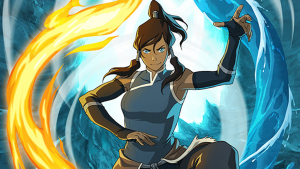Although this summer was… a bit terrible, one upside was Netflix adding one of my childhood favorite shows, Avatar: The Last Airbender. In the midst of everything bad happening in the world, it’s comforting to just regress back to old obsessions– or at least for me it is.
The only thing more I could ask for is for them to add The Legend of Korra— a show that has somehow managed to have an even dearer spot in my heart than ATLA. Finally, on August 14, my prayers were answered, and I could once again fall into a single-minded haze
The Legend of Korra, the follow-up to Avatar: The Last Airbender, is set 70 years after the events of the last show. This time around, there’s no imminent danger of a war spurring the characters on their adventure like in ATLA… yet. Instead, we start out seeing the new avatar training to master the elements. With fire, water, and earth under her belt, she has to go to Republic City to learn airbending with Aang’s son Tenzin.
While TLOK may take place in the same world as ATLA, it feels completely different. Now, we’re in a world transformed by innovation. Republic City is a great setting for many reasons. First of all, it’s great to see the city knowing that Aang and the rest of team avatar are the ones who laid the foundations for Republic City to become what it is today. Also, an early 1900s crime-infested city is just a fun setting in general.
I know everyone’s first instinct is to compare TLOK and ATLA, but the show itself tries to tell you right off the bat that this is a different show altogether. It may take place in the same world and have some of the new characters, but this is no longer Aang’s story– it’s Korra’s. Korra is a completely different character than the pacifist 12-year-old monk we know and love. She’s bold, hotheaded, and aggressive. As Tenzin puts it at one point, when she first shows up to Republic City, she’s reckless and a bit selfish. However, none of that stops her from eventually becoming a more level-headed, understanding hero for people to rely on.
One thing I appreciate about the show is the themes it explores, especially the lessons about family. It delves even more into family dynamics than its predecessor, examining everything from sibling relationships to parent/child relationships. The best part is that none of the characters are exempt from experiencing at least a little family drama every now and then; whether it’s the child characters learning how to get along with their siblings or the full-grown adults having to resolve their pent up childhood trauma, all the characters get to have some sort of resolution to their familial struggles.
Because the show is so liberal with letting everyone get some character development at some point or other, the show has a plethora of amazing, talented characters that all deserve love. Personally, I love me a good himbo like Bolin: he’s dumb, strong, talented, and just an all-around good dude. But more than just being a stupid hunk of meat, he’s a complex character who goes on his own path of self-reflection and discovering his own way in the world. He grows as a character, realizing his desire to help others and become a talented, well-respected bender while still holding all of his original charm of being a kind and chatty bro.
And then there are of course the ladies of the show that absolutely kill. I could go on forever about how much I love Korra or Asami or Lin Beifong or literally any of the female characters in this show but I won’t. The point is that the writers did a great job at creating dynamic and relatable characters.
I also have to admire the show for its great music. Although there aren’t any fun bops like “Secret Tunnel” or a tear-jerking equivalent to “Leaves From the Vine,” the upbeat and at some times suspenseful jazz that accompanies the industrial city atmosphere is perfect.Korra is a really emotional show for me — I break down in tears at least twice a season (even during rewatches). The connection I feel between me and the characters of this show — even the secondary characters — is stronger than a lot of other pieces of media I enjoy. Maybe that’s just because the Avatar world in general has always been special to me though.

Leave a Reply